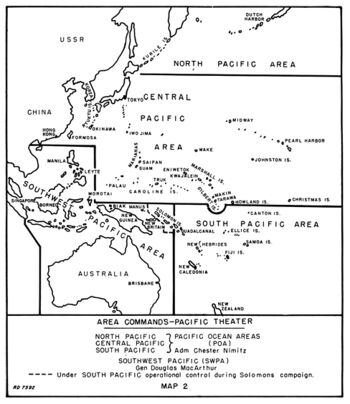Pacific Ocean Areas: Difference between revisions
imported>Russell D. Jones (capitalization rules at CZ are bassackwards....) |
imported>Russell D. Jones (Map) |
||
| Line 1: | Line 1: | ||
{{Subpages}} | {{Subpages}} | ||
[[Image:Ww2-pacific-theater.jpg|thumb|left|350px|Map of the theater of operations in the Pacific Ocean and East Asia during the [[Second World War]]. Charles W. Boggs Jr., ''[http://ibiblio.org/hyperwar/USMC/USMC-M-AvPhil/USMC-M-AvPhil-1.html Marine Aviation in Philippines]'' (Washington: Historical Division, Headquarters, U.S. Marine Corps, 1951), 2. ]] | |||
During [[World War Two]], the '''Pacific Ocean Areas''' was the name given by the [[Joint Chiefs of Staff]] to operational areas in the [[Pacific Ocean]] under the command of [[Chester W. Nimitz]]. Nimitz, as commander-in-chief Pacific Oceans Area used the abbreviation CINCPAC. | During [[World War Two]], the '''Pacific Ocean Areas''' was the name given by the [[Joint Chiefs of Staff]] to operational areas in the [[Pacific Ocean]] under the command of [[Chester W. Nimitz]]. Nimitz, as commander-in-chief Pacific Oceans Area used the abbreviation CINCPAC. | ||
Revision as of 08:22, 23 June 2010

During World War Two, the Pacific Ocean Areas was the name given by the Joint Chiefs of Staff to operational areas in the Pacific Ocean under the command of Chester W. Nimitz. Nimitz, as commander-in-chief Pacific Oceans Area used the abbreviation CINCPAC.
In the Second World War, there was no single Pacific command. This was done primarily to avoid personality conflicts with Douglas MacArthur. Faced with balancing unity of command in any situation involving both the immense ego and talents of MacArthur, as well as the immense talents and relaxed personality of Nimitz, the Joint Chiefs of Staff split the Pacific Theater of War into a Southwest Pacific Area under MacArthur, while Nimitz commanded the Pacific Ocean Areas, which included the North Pacific Area, Central Pacific Area, and South Pacific Area. Most of the operations under Nimitz's command occurred in the Central Pacific Area.
While there had long been a Pacific Fleet, there was also an Asiatic Fleet in the late 1930s and early 1940s. Japanese victories over the Asiatic Fleet at the start of the war and the problems associated with the short-lived Australia-Britain-Dutch-American command (ABDA) made a western Pacific command irrelevant. A China-Burma-India theater was formed, but was principally a land command.
Some unification was planned had there been a land invasion of Japan, but MacArthur and Nimitz essentially stayed co-equal through the Second World War.
The Pacific Ocean Areas evolved into the United States Pacific Command after the war.